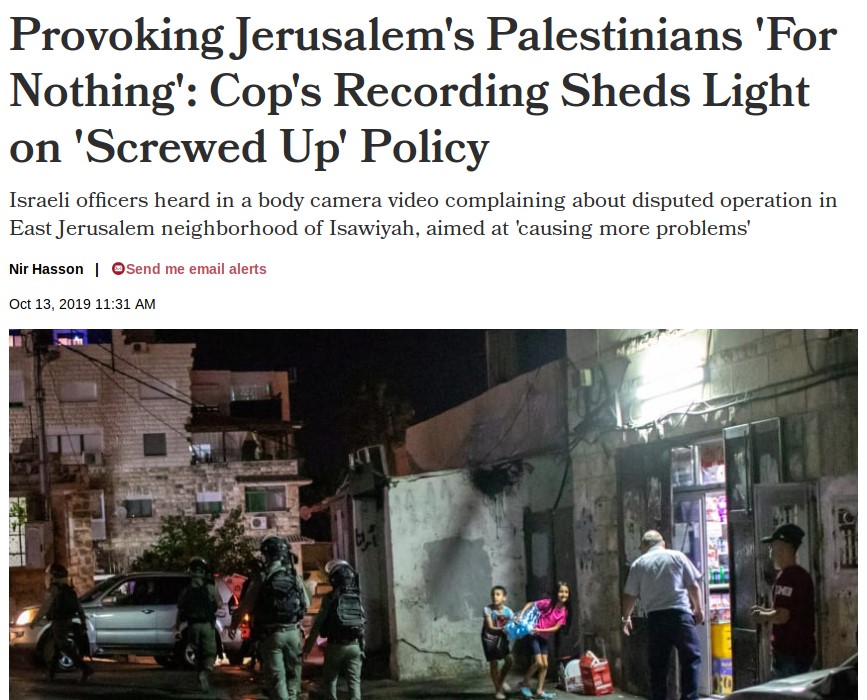On July 23, B’Tselem first reported on the police harassment of residents of the Isawiyah neighborhood in occupied East Jerusalem. The campaign, which began in June, included daily law enforcement and collective punishment raids, ostensibly in response to stone throwing. During one of the raids, 21-year-old neighborhood resident Muhammad ‘Abeid was killed. Although the harassment has abated somewhat since the beginning of the school year, it still continues at varying levels of intensity.
According to Haaretz (Oct. 13), Israeli police officers in Isawiyah were caught on camera complaining that there was no purpose to an ongoing police operation in the neighborhood, highly criticized by community leaders, other than deliberately provoking the residents. The video footage, which was seen by an Israeli court during a hearing on charges brought against a resident for throwing stones, shows one policeman telling his colleague: “It’s really provoking them for nothing. Why do this on purpose?”

Haaretz report on the systematic harassment of Palestinian residents of Isawiyah by Israeli police during the past summer, published on October 13
The police officers whose comments were caught on video stood near the mosque for several hours. Repeatedly one or another of the officers is seen raising his weapon as if purportedly aiming it a residents seen in the background. A large number of pedestrians and vehicles passed the policemen but none approached them.
The police officers are heard talking among themselves about the purpose of police operations in Isawiyah. One of them remarked “This is really provoking them for nothing.” The second police officer is heard agreeing. Later the first policemen said: “Why do this on purpose?” The second one replied: “Our policy is screwed up from the start.” The first policeman then comments: “Let them live. You’re provoking them here for nothing.”
The harassment includes daily raids on the neighborhood, detaining of residents returning from work, issuing of traffic tickets for spurious infractions, serving of house demolition orders, acts of violence, and detentions – particularly of minors.
Over the three summer months (June to the start of September), the police arrested around 350 residents of the neighborhood, some of whom were minors. The vast majority of the detainees were released after posting bail; in some cases, they were placed under house arrest for several days. In clashes that erupted between neighborhood residents and officers from the Special Patrol Unit and the Border Police during the raids and detentions, the security forces used violence, fired black sponge-tipped rounds and teargas canisters and stun grenades, and used pepper spray.
A B’Tselem field researcher examined ten incidents in which the Special Patrol Unit officers used extreme violence against neighborhood residents without any justification. Three incidents summarized briefly here will be discussed in detail below. On July 28 police officers entered the home of the ‘Abeid family and demanded access the roof of the house. They assaulted Fadi ‘Abeid, 26, who insisted on accompanying them, beating him and throwing a stun grenade at him, causing serious burns. On August 8, police officers raided the home of the Fakhuri family, despite having been told that the family’s children were at home alone. The officers broke down the door and arrested a boy aged 13, while his parents were not home, resorting to extreme violence while doing so. On August 12, police officers broke into the home of the al-Masri family while the extended family was gathering for the holiday meal. They beat members of the family and fired a sponge round at one of them from a just a few meters away. A black sponge-tipped bullet is considered a non-lethal weapon, but it is certainly capable of killing a person when fired at close range.
According to B’Tselem, “The police harassment of Isawiyah residents did not and is not taking place in a vacuum. It is an inseparable part of Israeli policy throughout East Jerusalem, which seeks to perpetuate a demographic majority for Jews in the city. This goal is pursued in part by devoting resources and efforts to making life in the city unbearable for Palestinians, so that they leave, ostensibly of their own will.”


